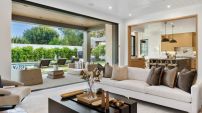David Baud sometimes starts framing the roof of a house before the foundation gets poured. But he’s not building castles in the air. He’s prefabricating complex building assemblies in his shop instead of out on the site. It’s a smart move that helps Baud maintain high standards for production quality and substantially increases his scheduling flexibility. Before the start of a project, the Rhode Island builder heads for his millwork shop and attacks the plans with a highlighter pen. “We highlight everything on the house that looks like a shop assembly,” he says. Eyebrow dormers, cupolas, roof monitors, curved balconies and decks; anything that requires special attention gets broken out for construction in the controlled environment of the shop. “We tell the framers, ‘Here’s where you have to leave a hole, and don’t even give us a price on that.’”
Quality is the primary motivator. “Most of the work we do is fairly unique and customized,” Baud says. “A lot of the pieces of the puzzle are very difficult to do on site.” In part because so many operations are simply easier to do indoors and at waist level, he says, “I know I can get a better job in the shop.” Baud’s millwork crew recently built a 6-foot-square cupola on the shop floor rather than 15 feet in the air out on the site. By the time it was craned into place, Baud says, “I even had the interior of it finished. The only thing we had to get up inside for was to do a little bit of trim and finish the painting. That’s where you get the labor efficiency.”
He gets scheduling efficiency, too. “You can have multiple parts of the crew working on different parts of the house at once, which expedites the schedule.” One of Baud’s current projects includes exposed, profiled rafter tails, and his shop crew started on them at about the same time the backhoe rolled onto the site. “Those rafter tails are being milled right now,” he reports. “There’s literally $75,000 to $100,000 worth of stuff that can be made right now, while the foundation is just going in.” Higher labor rates for shop work are typically offset by the efficiencies of prefabrication. “Worst case scenario, it’s even money,” Baud says. “Often it saves money.” While it may seem crazy to start a house at the top and work down, he admits, “To me, the shop setting is kind of a no-brainer.”
Baud Builders, Wakefield, R.I.
Type of business: custom builder
Years in business: 20
Employees: 7
2003 volume: $2.7 million
2003 starts: 3


